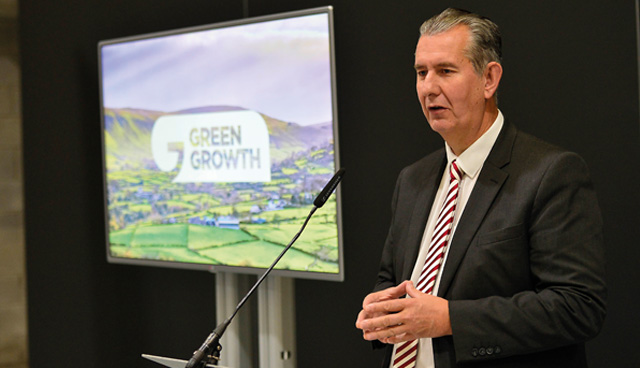Green Growth: Tackling the climate crisis

Climate change is the defining crisis of our time on a global and national scale and Northern Ireland is not immune, writes Minister for Agriculture, Environment and Rural Affairs, Edwin Poots MLA.
We have seen first-hand how climate change can lead to more frequent severe weather events and we face numerous other challenges aside, including improving our air quality, tackling plastic pollution, achieving zero waste and the development of a circular economy. We simply cannot continue with a ‘business as usual’ approach, we must act now before it is too late with a shared vision of the future and a plan to make it a reality.
I recently attended the 26th UN Climate Change Conference of the Parties (COP) in Glasgow. COP26 brought together signatory parties to the Convention from across the globe with the aim of accelerating action towards the goals of the Paris Agreement, realising this vision of a cleaner, more sustainable world must be a priority. Failing to do so would be irresponsible and the consequences unthinkable.
My department has recently, on behalf of the Northern Ireland Executive, launched a public consultation on a Green Growth Strategy for Northern Ireland. This cross-cutting multi-decade Strategy will set out the long-term vision and a solid framework for tackling the climate crisis by balancing climate action with a clean environment and the economy.
“Agriculture is one of the largest emitters of greenhouse gases in Northern Ireland and whilst this presents many challenges, I believe it also presents many opportunities.”
It provides us with an important opportunity to embed wider climate change, a green economy and environmental considerations, into decision making. This would ensure that new policies and programmes align with the need to address climate change, develop green jobs and address biodiversity commitments. This strategy represents a significant step forward for Northern Ireland as we move from a high to a low emissions society and as we balance climate action with environmental and economic considerations. I believe that this Green Growth approach is right for Northern Ireland; a Northern Ireland where we can all enjoy the longer term economic, social, health and environmental benefits that this brings.
My draft Climate Change Bill has now passed Second Stage in the Assembly and I am confident that, through this Bill, we can achieve the right balance between safeguarding the environment, the economy and society. It is steeped in science, is evidence-based and takes a common sense and realistic approach to what is an extremely complex issue that can only be addressed successfully by bringing those who can make the change along with us.
Agriculture
Northern Ireland will play its important part in reaching UK net zero by 2050, if not before. At this time, agriculture is one of the largest emitters of greenhouse gases in Northern Ireland and whilst this presents many challenges, I believe it also presents many opportunities. I recently published the Future Agricultural Policy Framework Portfolio for Northern Ireland which is set around four key outcomes: increased productivity; environmental sustainability; improved resilience; and a responsive supply chain. Higher productivity growth in our agri-industry, through science and innovation, must be achieved in a way that is compatible with improving environmental sustainability.
“The next decade must be one of urgent action and we must all play our part.”
The next decade must be one of urgent action and we must all play our part. Continuing to meet consumption by traditional methods is damaging our environment and we must address this to restore and protect the natural assets we rely on, whilst supporting their sustainable use. We must create green jobs, end our reliance on fossil fuels and provide opportunities through investment in innovation to help us develop new ways of working.
Collectively we can lay the foundations for a more sustainable society, which can rejuvenate our economy following the Covid-19 crisis, before irreparable damage is done.





